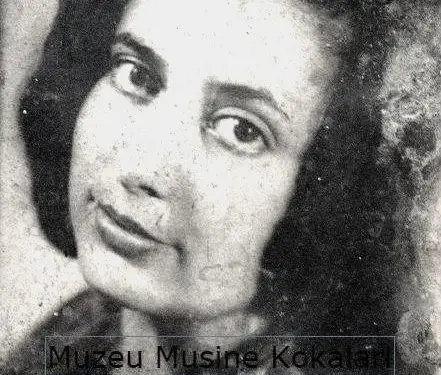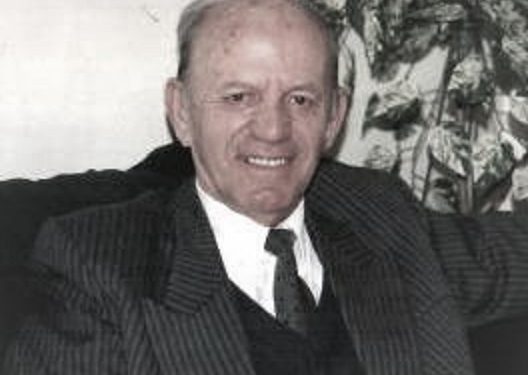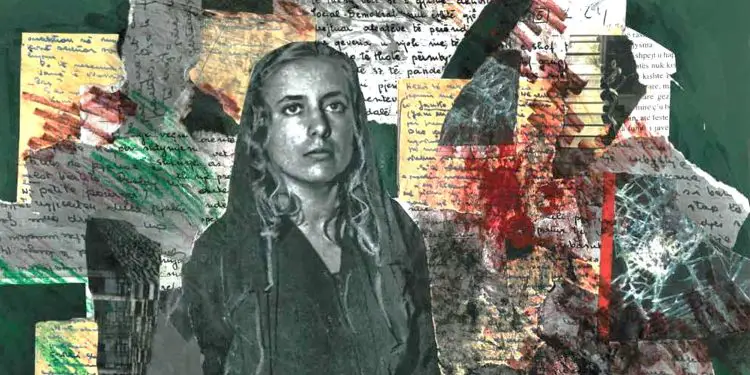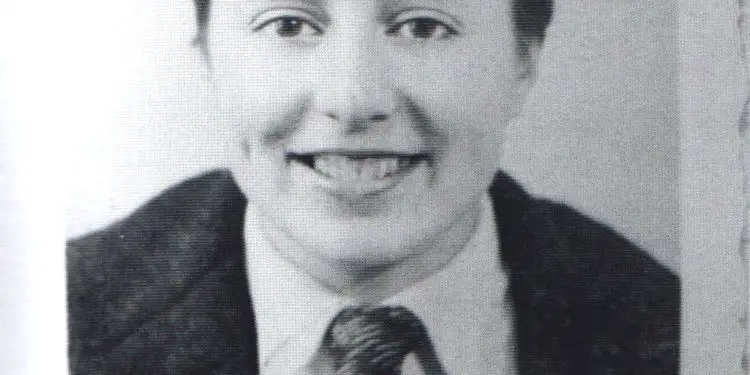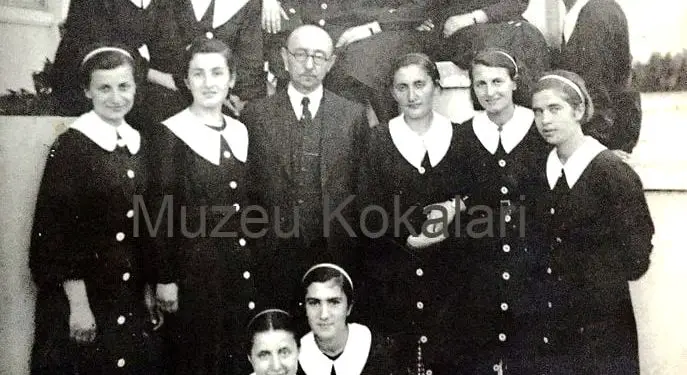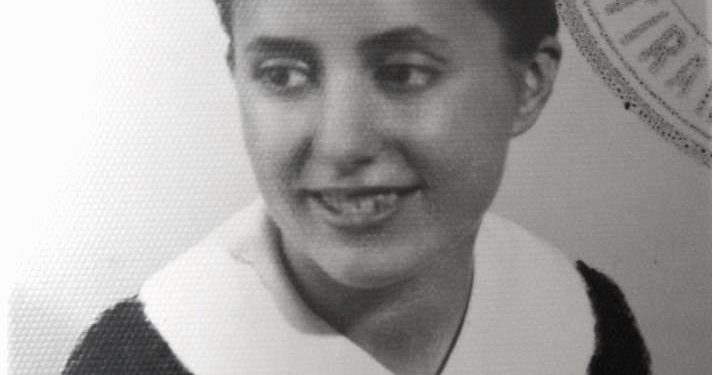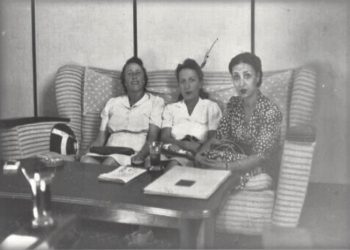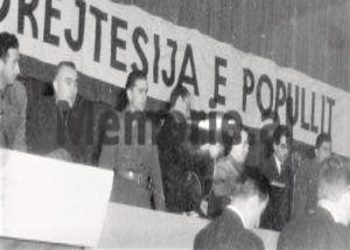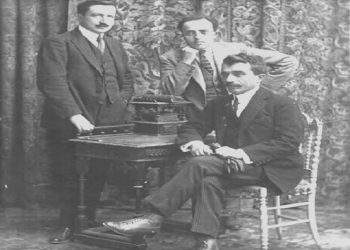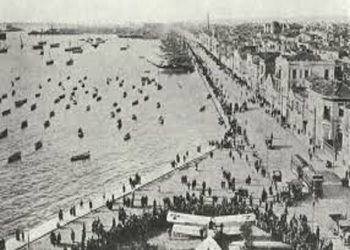By Makensen Bungo
The third part
Memorie.al/ A century ago in the family of the Albanian lawyer Reshat Kokalari, who lived at that time in the city of Adana in Turkey, after three sons, a daughter, who was named Musina, was born amid great joy. Four years later, the patriot Reshat Kokalari, moved from Turkey and his family headed for the Homeland, in the city of Gjirokastra. In the stone town this little girl spent her childhood and finished primary school. Later, this family moved to the capital, where daughter Musine started and finished high school “Nana Mbretneşe”.
Continues from the previous issue
Here’s what two of her friends say about Musine’s life in those dungeons:
COSTUME LIGHT:
“The executioners were enraged, they could not stand Musina’s spiritual attitude; they called her, they questioned her, they provoked her, but she was calm and unconcerned, proud and cultured, she didn’t give them a reason for anything”.
NURCE K0CULI:
“Musineja had a humane spirit. Whoever was sick, she immediately came to their aid. Whoever was depressed, she would take away his suffering and help him stand. She was the epitome of virtue.”
He spent 16 years in prison and led the wild life of those in the prisons of the dictatorship. But Musine entered; Musine came out from there, Musine Kokalari.
Deportation
He was released from prison on October 8, 1961. But his suffering did not end. When he got out of the prison, at his door, a “Jeep” of the Internal Branch was waiting for him. They put him in the car and interned him in Rrëshen, the city between the mountains, with many winters and late spring, with snow and rain, with little greenery and fewer flowers. Men’s place with elders’ assemblies. With more rifles than books. Nursery of faith, mahogany of generosity. They sent Musinena to that city, to that distant mountain city.
Among these high mountains, among those marshy fields, the dictatorship sent its opponents, to suffer after their sentences in prison. No jail sentences, no jail sentences. But with long suffering, more tiring, more piercing, more exhausting. The hatred of the dictatorship is terrible, savage, and deadly. This was the second punishment for the opponents of the dictatorship, ending in a slow, silent death.
Therefore, Musinena was not sentenced to be shot, but sentenced to twenty years in prison, so that he would suffer terribly all those years, until his death. They sheltered him in a spare room of a half-ruined house. In front of her room, a psychopath lived, who watched who entered and who left Musine’s room and quickly went and reported. And besides this man, they also put ten others to control her life in every place any time. She lived alone, in great solitude, in that room, where on the wall in front of her later, as she wrote, she placed several photographs:
“In my small room opposite, I have put the photo of the well-known illuminist Sami, of the poet Naim, of the patriot Sotir Kolea, of the worker of the Albanian language and of the National Movement, Jani Vreto, of the educator Koto Hoxhi, of the thinker Naum Veqilharxhi, of the honorable De Rada and the wise, Aleksandr Xhuvani…! In my loneliness I am not alone; I live with honorable, knowledgeable and democratic people, who have worked for the country, for the motherland until their eyes closed…! I am their student…”!
From these words that Musineja wrote, she shows her respect and love for the people who worked for her mother and looking at their pictures, she was proud of their activity, forgot the eternal loneliness in that poor room and boasted that she was the student of those men, who worked for Albania until I closed my eyes. A former persecuted political person told me how he got to know Musine during the first days in detention.
GEORGE MARK:
“I met Musine Kokalari when I was a student at Rrëshen high school. We asked each other what he had done that brought him to Rrëshen, where he was from, where were the people?! When we learned who she was, we began to feel love and respect for her. He lived in the worst house in Rëshen. He lived all alone. No one approached her, but she also did not approach others, so as not to harm them. She was a cultured woman. She was a regular visitor to the bookstore and the library. She dressed simply, but beautifully cleans. She wore a black leather coat and a shoulder bag.
Every day after work, he left the house and went to Ura e Fani and in the club there, he drank a coffee. We never looked down on him. He walked slowly, calmly and never lowered his head. That in appearance looked noble. The people spoke well of him.” While the lady from Mirdita, Prena Gjeci, her friend, has talked to me a lot about it.
PRENA GECCI
I am her oldest friend. I got to know her the first day she started working at Rrëshen and I broke up with her two days before she died. We worked on the ground in mortar, transporting bricks and stones; erecting walls. It was unlearned on the job. The first few days her hands and feet bled. Yet she never complained. At work it was very correct. He was courageous and never humbled himself. There were many wills. She worked as a skilled worker. He could not bear the injustices that were done to him at work. Against them he complained boldly. He had a great love for people. Even those who tried to tease her, throwing some words at her, she didn’t hate them. “It’s not their fault, it’s the fault of those who taught them”, he said and laughed.
He felt a great love for the poor. As much as he could, he helped them. He especially loved children. He talked to them, stroked them, hugged them and often gave them advice. He loved my daughter very much. Every Sunday he invited her for lunch. In her room next to the bed, she kept a big doll. He changed his clothes from time to time; he loved him as a child. I had a friend, I went to a friend. We became sisters from work full of suffering, from life full of horrors, from the disasters that fell on our heads. We talked to each other, about everything, we cried about our problems. She encouraged us about everything. And it has always been by my side, as noble as it was. I was very sorry that I did not take part in her funeral!
These two conversations about Musinena show us very well her attitude during the time of her internment in Rrëshen. Musineja spent many years in Rrëshen, many years with many hardships and hardships, hardships and hardships, amid continuous suffering. These evils and evils are created by dictatorships against their opponents, so that the dictators enjoy themselves and prolong their bloody lives.
But peoples do not forgive. They are impartial and indisputable judges. They then bravely rush upon the dictators, drag them out, judge them, and plunge them deep into the foul mire of their bloody crimes, while the heroes lift them up majestically into the pure heaven of immortality. This is what happened to Musine. With her attitude, she overcame the brutality of the dictatorship and honored herself as a staunch Albanian anti-communist.
Illness
The non-intervention of the allies to save Albania from the Slavic-communist yoke, its arrest by the dictatorship, the torture in the investigator, the stresses during the trial, the denial of freedom for a long time, in the prisons of the dictatorship, the long internment in Rrëshen, the solitary life and hard work during imprisonment and exile affected her health. He started to get weak, feel pain, worry and one day after the tests, he was informed that he was affected by the incurable cancer disease.
Admitted to the Oncology Hospital of Tirana, she waited to be operated on to fight her disease. But no one was interested. After this deliberate silence that they had to intervene, she realized the anti-human intent of the communist doctor, residing in the Government Leadership Block, and wrote: “I realized one thing. To me, not only do they not care, but they enjoy dragging me down. And the checks of these months are nothing but empty words. According to the rules, I should have been operated here six months ago. What will it look like…”?!
The words of this democratic woman best show the class war that the communist doctor of “Blok” used to bury this “enemy of the people”. Why was this humane duty of a doctor? To cure a sick person, or to kill him, how much faster?! She returned to Rreshen sick and untreated, depressed and wrote in her diary: “What a tragic fate! The disease also turned against me. At least I had some peace in the last years of my life”! In those difficult moments of her life, she then analyzed her life:
“Once upon a time I said to myself, that I did not gain anything that I remained alive. Perhaps, it would have been better to have closed my eyes once and for all. This is how the suffering ended, despite the tragic situation. That would be a very good solution! These are what Musineja thought in those moments of her life, full of suffering, with bitterness, with horror, with torture, with persecution from a terrible, cruel dictatorship, just because she wanted freedom without blood, peace for all and love between all. And tired, bored, sick, without any hope of salvation, she left us to write, the synthesis of her life:
“I got to know the democratic culture. I recognized the tragedy of great revolutionary upheavals. I knew a ‘Special Trial’, I knew 16 years in prison and a crash, here and there. I recognized the work of the worker with an individual rate; I recognized the side work with a collective rate, such as agriculture and construction. I recognized the self-sought solitude, the occasional society in prison and all the changes that follow from this ceaseless earthquake, to consolidate the dictatorship of the proletariat.” Is there a more complete analysis of life than the analysis that this great woman makes of her life!?
Then Musineja began to live with death. He left his job, retired, with half salary, lived in poverty with 200 old ALL a month, alone, without anyone to see him for the last time, with a silence that kills, without anyone around to gives her a glass of water, prefiguring her heroic life and her terrible sufferings, which she had gone through under the dictatorship. And finally, one day on the verge of death, she wrote in her diary: “…in the small suitcase, I have some items of ethnographic value, for the Museum of Gjirokastra. Those few savings and everything else let them go into the press fund, which must be created for the manual worker, which is necessary to democratize manual labor and culture the simple worker.”
There was nothing else for this Musine of Albania. That was all there was in that small suitcase. And she left these for her country, for the press, for the farmer, for the worker, for whom she had worked all her life and was persecuted by the dictatorship of the proletariat. Even in the last moments of her life, she thought about her country, about the farmer and the worker, about those who had thought and worked throughout her life and for whom she had suffered all those terrible sufferings, from the dictatorship of the proletariat.
DEATH
He lived as long as he lived and one day he died. It was August 13, 1983. There was no one around to close his eyes. There was no one to pray for her soul. Next to her, in those moments, there were only books, her “friends”. The book she was reading those last moments of her life fell on her open chest and she was done. Died reading. He grew up with books in his hands, lived writing books and died in the company of books. They buried her the next evening, because they did not accept any driver to transport the coffin with her corpse. Dictatorship fights even the dead.
Mr. Agim Haruni, a former political prisoner, told me: “He died alone. We lived in a house with him. I went to the room and found him dead. It was lying on her bed. On his chest I found an open book. He was dead reading. No one was interested in her burial. We buried him the next day.”
Mrs. Ildishane Kalo, a friend of hers, said: “Musineja was unlucky even on the day of her death.” We, who were close to them all our lives, were not there. Musineja died on August 13, 1983. It was a hostage to me that I did not reach him alive, I Musua. A neighbor entered the room after her son alerted her and closed her eyes. They went mother and daughter and informed the head of the Council, and then they called us. We also sent a telegram to her cousin in Kavaje, but he did not come. It came only after two, three days.
I will never forget that she woke up alone, all alone, her last night on earth, locked in a lock. Not even a car was found for Musine, to take her to the cemetery. Only one driver with a reportable car, who had been loading gravel all day, agreed to come with a hundred prayers. We put the coffin on the gravel. I accompanied him, Muzua, my husband and the neighbor’s son, who found him dead. This was the funeral ceremony, which took place in Rrëshen, at dusk on August 14, 1983″. Taken from the book “SONATA OF THE MOON”, by the writer Eglantina Mandija.
Reburial
Before the dictatorship, no one mentioned her name. After 13 years, on January 17, 1990, her remains were exhumed and placed in Tirana. Today, she rests in the capital next to her parents and brothers. I described her reburial in the story “Martyrja”.
Here is her burial, according to that story:
“Walking with the coffin in her hands, she approached the place where her father’s and mother’s graves were and placed the coffin next to them, on top of the freshly dug grave. Among the people who had come to take part in that reburial, there was a slight murmur. Many of them sighed worriedly. Someone couldn’t hold back and a tear of sorrow slowly slipped down the cheekbones.
Various people, who shot nearby that night Kadri, when they saw that small coffin, asked whose it was. When they learned her name, some were surprised that she was dead, others, who knew her dead, were glad that her remains had been brought back to her hometown. A man, when he heard her name, said to the people nearby: “This woman has written beautiful books.”
An old man with eyes from the coffin told his friends proudly: This woman fought against the dictatorship, like a man who went to men. Many went and laid their hands on the small coffin, with a deep pain. A woman approached the coffin, sat down, put her hands on it and kissed it. “We were neighbors,” he said and shook his head. Then he looked at the people around and added: “Desert girl! He suffered from black olives. The earth will tremble and be poisoned when it takes the bones of this martyr into its bosom”.
She got up slowly, like the old woman she was, and left with tears in her eyes. In all the graves, candles and candles continued to illuminate the place from side to side. As if the stars had come down after a long day. He looked up from the people and felt a deep joy. Then he took the small coffin and slowly placed it inside the grave. As soon as they had covered the grave with earth, a woman struggled through the crowd and approached the grave was very old and walked with difficulty breathing. In his hand he held a white lily. As he approached the grave, he stood a while and said:
“I am a man without a man. My husband died in Burrell prison, my only son was killed at the border. I didn’t even find their graves. I came here to place this white lily on the grave of this martyr. It’s our daughter.” He sat down slowly and placed the white lily on the grave. Then he began to caress the grave with trembling hands. And caressing the grave of that martyr, he said: “It seems to me that I caress the grave of my son.” And with tears in his eyes he kissed the tomb of that martyr several times.
THE RESURRECTION
Since 1990, the name of this girl is mentioned with honor and respect. The artistic activity and especially the political activity is appreciated in Albania and in other countries. Her name is mentioned in an Italian encyclopedia. In her honor, commemorative symposia have been held. Streets, cultural centers, libraries and schools are named after her. Works on her activity have also been published. The figure of Musine Kokalari has been highly appreciated by personalities of the Albanian state and culture. Memorie.al




